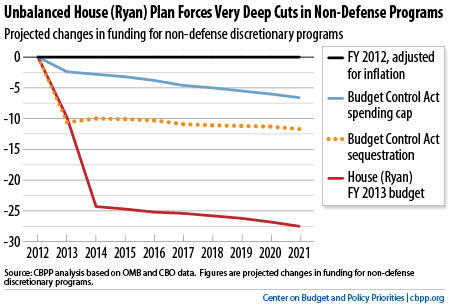BEYOND THE NUMBERS
For Housing Assistance Recipients, Unbalanced Budget Deal Would Be Worse Than No Deal at All
The fact that policymakers are working to avoid “sequestration” — the harsh, indiscriminate program cuts scheduled to begin in January — is good news for the millions of low-income families that rely on federal assistance to obtain decent housing. But the risks to these families could be even greater if policymakers agree on an unbalanced budget deal that lacks significant revenues. Our new report explains why.
Any deal will need to reduce projected deficits by a substantial amount — perhaps by as much as $2 trillion or more over the next decade. Yet policymakers generally agree on avoiding cuts in Social Security and Medicare benefits for current retirees, and many oppose cutting defense below the levels set by last year’s Budget Control Act (BCA).
This leaves just three areas of the federal budget: non-defense discretionary spending, which policymakers have already cut by about $900 billion over the next decade (and which includes housing assistance, community development, and many other programs funded through annual appropriations), low-income entitlement programs such as Medicaid, and revenues. If a budget deal does not include substantial revenues, it will be nearly impossible to avoid very deep cuts in low-income programs.
The House-passed budget resolution — which relies entirely on spending cuts to cut projected deficits — shows how deep these cuts could be. Its cuts in non-defense discretionary funding would be more than twice as deep as the cuts under sequestration (see chart).

As many as 1.2 million households containing low-income seniors, people with disabilities, and families with children could lose rental assistance by 2021 under the House budget, and communities could lose more than $1.3 billion in annual funds for affordable housing and community development. (See Tables 2a–2g of the report for state-by-state estimates of the potential cuts to core programs.) These cuts would come on top of cuts made in 2011 and 2012.
Bipartisan deficit reduction commissions — including the Bowles-Simpson commission — have supported the principle that deficit reduction shouldn’t force the most vulnerable Americans to bear greater hardships than they already do. An important part of sustaining the safety net is preventing further cuts to housing assistance and community development programs. And only a thoughtful, balanced approach to deficit reduction can accomplish that.
